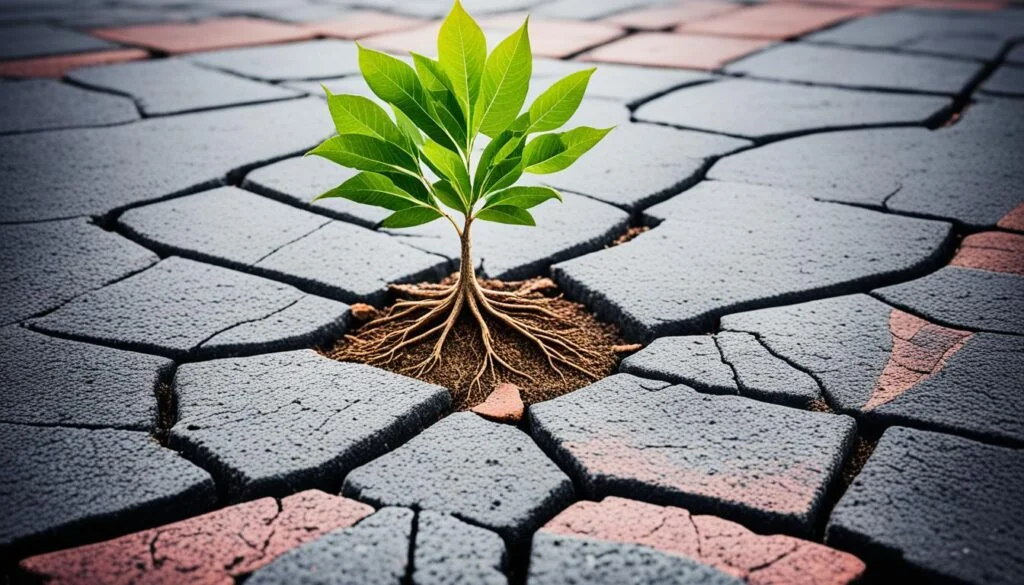
Welcome to our guide on cultivating resilience and building mental toughness. In today’s fast-paced and demanding world, resilience has become an essential skill for success and well-being. Whether you’re facing challenges in the workplace or dealing with personal hardships, developing resilience can help you bounce back and maintain a positive outlook.
Resilience refers to our ability to adapt well in the face of adversity and difficult situations. It involves building the necessary skills and strategies to cope with stress, setbacks, and uncertainty. By investing in resilience training and developing resilience skills, you can strengthen your mental fortitude and enhance your ability to navigate life’s ups and downs.
In this article, we will explore various resilience-building techniques and strategies that can help you cultivate mental toughness. From mindfulness and meditation to developing a growth mindset, we will provide you with practical tools and insights to develop your resilience and thrive in challenging circumstances.
Key Takeaways:
- Cultivating resilience is essential for adapting to stress and difficult events.
- Meditation can be an effective tool in developing resilience.
- Vulnerability plays a crucial role in mental toughness and overcoming challenges.
- Regular meditation practice can improve stress response and enhance mental resilience.
- Strategies for building mental strength include cultivating a growth mindset and practicing emotional regulation.
The Role of Vulnerability in Mental Toughness
Vulnerability plays a significant role in mental toughness and resilience. It is important to recognize that vulnerability does not equate to weakness. Just as physical stress during exercise can make us stronger, acknowledging and embracing vulnerability can contribute to mental strength. Mindfulness can help us navigate vulnerability by allowing us to become curious about our emotions and experiences. By acknowledging and understanding our feelings, we can begin to let go and choose how we respond to challenging situations.
When we embrace vulnerability, we open ourselves up to growth and transformation. It is through vulnerability that we can confront our fears, face adversity head-on, and develop the mental toughness necessary to overcome obstacles. In fact, research has shown that individuals who are willing to be vulnerable are more likely to experience personal and professional growth, build stronger relationships, and cultivate resilience.
“Vulnerability is not winning or losing; it’s having the courage to show up and be seen when we have no control over the outcome.” – Brené Brown
In the face of vulnerability, practicing self-compassion is crucial. It involves treating ourselves with kindness and understanding, rather than self-criticism. Self-compassion allows us to acknowledge our vulnerabilities without judgment, which in turn strengthens our mental toughness and resilience.
The Power of Vulnerability
Research has found that vulnerability enhances our ability to connect with others on a deeper level. When we allow ourselves to be open and vulnerable, we create opportunities for genuine emotional connections, empathy, and support from those around us. This social support acts as a protective factor, bolstering our resilience and providing a sense of belonging.
In addition, vulnerability fosters authenticity. By embracing our vulnerabilities, we break free from the need to wear masks or present ourselves as perfect. This authenticity allows for genuine self-expression and fosters stronger relationships built on trust and understanding.
Developing Vulnerability in Practice
Developing vulnerability requires practice and a willingness to step outside of our comfort zones. Mindfulness can be a powerful tool in this process. By cultivating present moment awareness, we can create the space to acknowledge and accept our vulnerabilities without judgment.
One effective mindfulness exercise is the body scan meditation. This practice involves bringing our attention to different parts of our body, noticing any sensations or emotions that arise, and simply observing them without judgment. Through this practice, we can develop a greater sense of self-awareness and acceptance of our vulnerabilities.
It is also beneficial to seek support from others who value vulnerability and understand its importance. Surrounding ourselves with individuals who embrace vulnerability can create a safe and supportive environment for personal growth and resilience.
| Vulnerability | Mental Toughness | Resilience |
|---|---|---|
| Ensures personal and professional growth | Strengthens our ability to face adversity | Allows us to bounce back from challenges |
| Enhances emotional connections | Fosters authenticity and genuine self-expression | Builds trust and understanding in relationships |
| Requires self-compassion | Bolsters resilience and sense of belonging | Create opportunities for personal development |
The Benefits of Meditation for Mental Toughness
Scientific research has shown that meditation offers numerous benefits for mental toughness and resilience. Not only does regular meditation practice help reduce stress and promote mindfulness, but it has also been found to significantly increase our ability to bounce back from challenges and recover from difficult emotions.
In one study conducted with participants who meditated using the Headspace app for 30 days, there was an impressive 11% increase in resilience. This indicates that meditation can have a positive impact on our ability to adapt well to stressors and maintain a sense of confidence and control.
Meditation can significantly increase mental resilience.
Another study involving the use of the Headspace app found that stress levels were reduced by a third after just 30 days of regular meditation practice. This reduction in stress can lead to improved mental well-being and a greater capacity to handle challenges and setbacks effectively.
Furthermore, a study conducted with US Marines demonstrated the effectiveness of mindfulness-based training in helping individuals recover from stress and build resilience in demanding situations. This indicates that meditation can be a valuable tool for developing mental toughness, particularly in high-pressure environments.
Interestingly, research has also found that regular meditation practice can have positive effects on our physical health. One study showed that meditation can reverse the DNA linked to depression on a molecular level. This suggests that meditation not only improves our mental resilience but also has potential benefits for overall well-being.
The evidence is clear: investing time in meditation can have a profound impact on our mental toughness, resilience, and stress reduction. By incorporating meditation into our daily routine, we can cultivate a calmer and more resilient mindset, enabling us to navigate life’s challenges with greater ease.
Six Meditations for Building Mental Toughness and Resilience
When it comes to building mental toughness and resilience, meditation can be a powerful tool. The Headspace app offers a range of courses and individual meditations specifically designed to improve these qualities. With these guided meditations, you can develop a stronger and more resilient mindset to face life’s challenges with greater confidence and clarity.
Letting Go of Stress Course
The Letting Go of Stress course is designed to help you develop awareness and reframe negative emotions. By practicing these meditations, you can learn to let go of stress and cultivate a more resilient mental state. This course provides valuable techniques for managing stress and building resilience in your everyday life.
Managing Stress in Uncertain Times
In uncertain times, stress can become overwhelming. The Headspace app offers meditations specifically tailored to help you manage stress during uncertain periods. These meditations can provide support and guidance as you navigate through challenging situations, empowering you with resilience-building techniques.
Relieving Stress
When stress levels rise, it’s important to have effective strategies for relief. The Headspace app offers guided meditations that focus on relieving stress and promoting relaxation. These meditations can help you unwind, reduce anxiety, and cultivate a sense of calm, contributing to your overall resilience.
Managing Anxious Moments
Anxiety can be a significant obstacle on the path to resilience. That’s why the Headspace app provides meditations specifically designed to help you manage anxious moments. With these guided meditations, you can develop techniques to navigate through anxiety and build resilience in the face of uncertainty.
Managing Anger Constructively
Anger can often hinder our ability to respond effectively to challenges. The Headspace app offers meditations that focus on managing anger constructively, helping you develop tools for emotional regulation. By cultivating mindfulness and compassion, you can transform anger into a constructive force, enhancing your resilience in difficult situations.
These six meditations are just a glimpse of the resources available on the Headspace app, offering a comprehensive approach to building mental toughness and resilience. By incorporating these practices into your daily routine, you can develop the skills needed to navigate life’s challenges with greater ease and fortitude.
Developing Mental Strength: Strategies for Resilience
Building mental strength is a process that requires developing and maintaining healthy habits. One key strategy is cultivating a growth mindset, which involves believing that abilities and intelligence can be acquired through dedication and hard work.
Having a growth mindset is essential for building resilience, as it allows us to view challenges and setbacks as opportunities for growth and learning. By embracing a growth mindset, we can develop the belief that our abilities and skills can improve with effort and practice.
“The only limit to our realization of tomorrow will be our doubts of today.”
In order to cultivate a growth mindset, it is essential to challenge negative self-talk and replace it with positive affirmations. By reframing negative thoughts into more positive and empowering ones, we can develop a stronger sense of self-belief and resilience.
Emotional regulation is another important aspect of resilience. By developing the ability to effectively manage and respond to emotional experiences, we can navigate through challenging situations with greater ease. Practicing techniques such as deep breathing, mindfulness, and self-reflection can help regulate our emotions and prevent them from negatively affecting our well-being.
Setting realistic goals is also crucial for building resilience. By setting achievable goals, we can maintain a sense of progress and accomplishment, even in the face of setbacks. This can help us stay motivated and resilient in the pursuit of our goals.
Furthermore, establishing a strong support system can contribute greatly to our mental resilience. Surrounding ourselves with supportive and encouraging individuals who inspire and uplift us can provide the necessary emotional and social support during challenging times.
“Surround yourself with only people who are going to lift you higher.”
Practicing self-compassion is another powerful strategy for building mental strength. It involves treating ourselves with kindness and understanding, especially during times of difficulty or failure. By practicing self-compassion, we can develop a more positive and resilient mindset, enabling us to bounce back from setbacks with greater ease.
Stepping out of our comfort zones is also essential for building resilience. By embracing new challenges and experiences, we can develop the adaptability and flexibility needed to navigate through life’s uncertainties. Stepping out of our comfort zones allows us to expand our capabilities and develop greater mental strength in the face of change.
Finally, establishing a daily routine that supports our well-being is crucial for building mental strength. By consistently engaging in activities that promote our physical, mental, and emotional well-being, we can enhance our overall resilience and ability to cope with stressors.
“Success is not the key to happiness. Happiness is the key to success. If you love what you are doing, you will be successful.”
By implementing these strategies in our lives, we can develop the mental strength and resilience needed to overcome challenges, adapt to change, and thrive in an ever-changing world.
The Relationship Between Resilience and Mental Health
Resilience plays a crucial role in maintaining good mental health. It acts as a protective factor against the development of mental health conditions such as depression and anxiety. When facing stressful situations or traumatic events, individuals with higher resilience levels are better equipped to cope effectively, minimizing the risk of experiencing debilitating mental health issues.
One of the key benefits of resilience is its ability to help individuals navigate factors that increase the vulnerability to mental health conditions. For example, those who have experienced trauma or bullying are less likely to develop lasting psychological distress if they possess strong resilience skills.
Developing resilience skills can significantly enhance an individual’s ability to manage and cope with stressors and challenges. By building resilience, individuals are better equipped to bounce back from setbacks and adapt to difficult circumstances, leading to improved mental well-being. Resilience empowers individuals to face adversity with strength, determination, and hope.
“Resilience is knowing that you are the only one that has the power and the responsibility to pick yourself up.” – Mary Holloway
By cultivating coping skills and resilience-building techniques, individuals can develop the mental strength necessary to face life’s challenges head-on. Resilience enables individuals to rebound from adversity and maintain a positive outlook, even in the face of adversity. It empowers us to overcome obstacles, regulate our emotions effectively, and maintain a sense of control amidst chaos.
Coping Skills and Resilience
Developing strong coping skills is an integral part of building resilience. Coping skills provide individuals with the tools and strategies necessary to manage stress, regulate emotions, and navigate challenging situations. Effective coping skills promote mental well-being and help individuals build resilience in the face of adversity. Some key coping skills that contribute to resilience include:
- Problem-solving: Developing proactive problem-solving techniques can help individuals tackle challenges head-on and find solutions.
- Emotional regulation: Learning to manage and regulate emotions effectively allows individuals to navigate stressful situations without being overwhelmed by negative feelings.
- Mindfulness: Practicing mindfulness techniques enables individuals to live in the present moment and cultivate a greater sense of calm and self-awareness.
- Seeking support: Building a strong support network of family, friends, and professionals can provide invaluable assistance during difficult times.
- Self-care: Prioritizing self-care activities such as exercise, relaxation, and engaging in hobbies can recharge and rejuvenate the mind and body.

Building resilience is an ongoing process that requires dedication and practice. By cultivating coping skills and resilience-building techniques, individuals can fortify their mental health, enhance their ability to cope with adversity, and lead fulfilling lives.
Tips for Building Resilience
Building resilience involves various strategies that can help individuals navigate difficult times and bounce back from setbacks. By implementing the following tips, you can strengthen your resilience and develop a mindset that allows you to thrive in the face of challenges.
1. Cultivate Support Systems
Connecting with loved ones and building strong relationships can provide invaluable support during challenging times. Reach out to friends, family, or support groups to share your experiences and seek guidance. Surrounding yourself with positive influences can contribute to a resilient mindset.
2. Find Meaning in Daily Activities
Setting goals and finding meaning in your daily activities can give you a sense of purpose and direction. Engage in activities that align with your values and interests, as they can contribute to a greater sense of fulfillment and enhance your overall resilience.
3. Reflect on Past Experiences
Take time to reflect on past experiences and consider how you navigated challenges. By understanding your coping patterns and identifying strategies that worked well for you in the past, you can apply that insight to guide your future behaviors and enhance your resilience.
4. Practice Self-Care
Taking care of yourself is crucial for building resilience. Engage in activities that promote relaxation, such as hobbies, exercise, or mindfulness practices. Prioritize self-care and make time for activities that bring you joy and rejuvenation. By taking care of yourself, you’ll be better equipped to handle life’s challenges.
5. Be Proactive in Problem-Solving
Proactively addressing problems and taking action can help build resilience. Instead of dwelling on difficulties, focus on solutions and take small, manageable steps to tackle challenges. By taking a proactive approach, you’ll develop confidence in your ability to overcome obstacles and build resilience.
| Tips for Building Resilience |
|---|
| Cultivate Support Systems |
| Find Meaning in Daily Activities |
| Reflect on Past Experiences |
| Practice Self-Care |
| Be Proactive in Problem-Solving |
Implementing these tips can empower you to build resilience and face life’s challenges with strength and determination. Remember, building resilience is a lifelong journey, and each step you take strengthens your mental fortitude.
Seeking Professional Advice for Building Resilience
Developing resilience skills takes time and practice. If individuals feel they are not making progress or need guidance, seeking help from a mental health professional can be beneficial. A mental health professional can provide guidance, support, and specific strategies to improve resilience and overall mental well-being.
Resilience training requires a personalized approach tailored to individual needs. A mental health professional can assess an individual’s current resilience levels and design a customized plan to target areas that require improvement. Their expertise and experience in mental health can help individuals navigate challenges and develop practical coping mechanisms.
Benefits of Seeking Professional Advice:
- Expertise: Mental health professionals have in-depth knowledge and understanding of resilience and can offer evidence-based strategies.
- Individualized Approach: Professionals can assess specific challenges and tailor interventions to address personal needs effectively.
- Safe Space: Sessions with a mental health professional provide a confidential and non-judgmental environment to explore emotions and experiences.
- Accountability and Support: Professionals can provide ongoing support, encouragement, and accountability throughout the resilience-building process.
Remember, seeking professional advice is not a sign of weakness but a proactive step towards personal growth and well-being. Just as we consult experts in other areas of our lives, seeking guidance from a mental health professional for resilience training is equally important.

| Benefits of Seeking Professional Advice |
|---|
| Expertise |
| Individualized Approach |
| Safe Space |
| Accountability and Support |
The Lifelong Journey of Building Resilience
Building resilience is a lifelong journey that requires consistent effort and self-care. It is a process of nurturing mental strength and adapting to life’s challenges. Practicing resilience skills, learning from past experiences, and maintaining a positive outlook on the future contribute to ongoing growth and development. Acknowledging that setbacks and negative emotions are a natural part of life can help individuals approach challenges with resilience and optimism.
Throughout life, we encounter various obstacles and adversities that test our mental strength. The ability to bounce back from these challenges and maintain a sense of emotional well-being is paramount. Building resilience is not a one-time task but rather an ongoing commitment to personal growth and self-improvement.
Developing mental strength and resilience involves honing coping mechanisms, enhancing problem-solving skills, and cultivating a positive mindset. It requires consistent practice and a willingness to embrace change and adapt to new situations.
One key aspect of building resilience is practicing resilience skills. These skills include emotional regulation, mindfulness, and maintaining healthy relationships. By consciously working on these skills, individuals can enhance their mental fitness and prepare themselves for the inevitable ups and downs of life.
The Role of Resilience Skills:
1. Emotional Regulation: Resilient individuals have the ability to manage their emotions effectively. They understand that it is normal to experience a range of emotions, but they also know how to regulate and express these emotions in a healthy way.
2. Mindfulness: Mindfulness techniques, such as meditation, can help individuals develop present-moment awareness and foster a sense of inner calm. By practicing mindfulness, individuals can cultivate mental clarity and reduce stress levels.
3. Healthy Relationships: Building and nurturing supportive relationships is crucial for resilience. Having a strong support system can provide individuals with the emotional support and encouragement needed during challenging times.
Learning from past experiences is another vital aspect of building resilience. Reflecting on previous obstacles and triumphs can provide valuable insights into one’s coping mechanisms and problem-solving skills. It allows individuals to identify what worked well in the past and make adjustments for future challenges.
Maintaining a positive outlook on the future is a fundamental part of a resilient mindset. It involves fostering optimism, setting realistic goals, and cultivating a growth mindset. By believing in one’s ability to learn and grow through adversity, individuals can approach challenges with confidence and determination.
“Building resilience is like planting a seed. With nurturing and care, it grows into a strong and flourishing tree, able to weather any storm.”
| Benefits of Building Resilience | Strategies for Building Resilience |
|---|---|
| – Enhanced mental well-being | – Practicing self-care and stress management |
| – Improved adaptive skills | – Cultivating a growth mindset |
| – Better problem-solving abilities | – Establishing a support system |
| – Increased emotional stability | – Setting realistic goals |
| – Strengthened self-confidence | – Reflecting on past experiences |
Conclusion
Building mental toughness and resilience is paramount for effectively navigating life’s challenges. By cultivating resilience skills, individuals can develop a mindset that empowers them to bounce back from setbacks, adapt to change, and maintain emotional well-being. The journey towards mental toughness and resilience requires ongoing effort and a commitment to personal growth.
Meditation and mindfulness practices play a crucial role in strengthening mental resilience. Through regular practice, individuals can train their minds to respond more effectively to stress and difficult emotions, and recover more quickly from challenging situations. Additionally, support systems and self-care strategies provide essential pillars of support for building mental strength and enhancing overall resilience.
It is important to remember that building mental toughness and resilience is a lifelong journey. By embracing the challenges and setbacks that come our way, we can develop a growth mindset and approach life with optimism and perseverance. By incorporating the principles of mental toughness and resilience into our daily lives, we can navigate adversity with grace and emerge stronger on the other side.
FAQ
What is resilience?
Resilience is our ability to adapt well when faced with significant stressors or difficult events. It allows us to bounce back from challenges more quickly and maintain a sense of confidence and control.
How does vulnerability play a role in mental toughness and resilience?
Vulnerability plays a significant role in mental toughness and resilience. It is important to recognize that vulnerability does not equate to weakness. Just as physical stress during exercise can make us stronger, acknowledging and embracing vulnerability can contribute to mental strength.
What are the benefits of meditation for mental toughness?
Meditation has been shown to increase resilience by improving our response to stress and helping us recover more quickly from difficult emotions. By practicing meditation, we can strengthen our minds and change our relationship with challenging thoughts and feelings.
Are there specific meditations for building mental toughness and resilience?
Yes, the Headspace app offers several courses and individual meditations specifically designed to improve mental toughness and resilience. These include meditations for managing stress, relieving stress, managing anxious moments, and managing anger constructively.
What strategies can help in developing mental strength and resilience?
Building mental strength involves cultivating a growth mindset, practicing emotional regulation, setting realistic goals, strengthening support systems, practicing self-compassion, stepping out of comfort zones, and establishing a daily routine.
How does resilience relate to mental health?
Resilience plays a crucial role in mental health. It can protect against the development of mental health conditions such as depression and anxiety. Resilience also helps individuals cope with factors that increase the risk of mental health conditions, such as trauma or bullying.
What are some tips for building resilience?
Tips for building resilience include connecting with loved ones, finding meaning in daily activities, reflecting on past experiences, taking care of oneself through activities and stress management, and proactively addressing and solving problems.
When should I seek professional advice for building resilience?
If individuals feel they are not making progress or need guidance in building resilience, seeking help from a mental health professional can be beneficial. A mental health professional can provide guidance, support, and specific strategies to improve resilience and overall mental well-being.
Is building resilience a lifelong journey?
Yes, building resilience is a lifelong journey that requires consistent effort and self-care. It is a process of nurturing mental strength and adapting to life’s challenges. It requires ongoing growth and development.
Source Links
- https://www.mayoclinic.org/tests-procedures/resilience-training/in-depth/resilience/art-20046311
- https://www.headspace.com/articles/mental-toughness
- https://www.calm.com/blog/mental-strength
More Wellness posts
Embracing Solitude: The Art of Spending Time Alone
Laughter Yoga: The Healing Power of Laughter
Creating a Home Sanctuary: Designing for Mental Wellness

Welcome! I’m Luke, a certified personal trainer with over 14 years of experience. With a BSc (Hons) in Sports Science, I specialize in tailored fitness programs for diverse clients who want to improve their lifestyle through exercise and healthy eating.




